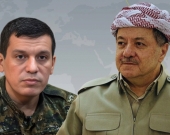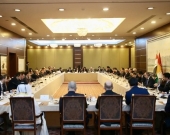Flash floods kill seven in Saudi, 11 in Iraq

Five other people are still missing after parts of the capital Riyadh and the northe-astern city of Arar were inundated, authority spokesman Colonel Abdullah Al Harithi told the official SPA news agency.
Meanwhile, flooding in central and southern Iraq killed at least 11 people as rising waters swamped city streets and toppled buildings, sparking anger over the dilapidated sewage system.
In Saudi Arabia, the storms that have accompanied the downpours have brought down power lines, sparking outages in parts of north Riyadh.
Schools and universities in the capital have been closed since Sunday.
Flooding of underpasses on major thoroughfares has sparked traffic chaos for Riyadh’s more than five million residents.
Saudi Arabia normally experiences such low rainfall that religious leaders often organise special prayers for rain.
But in May last year, around 20 people were killed in flooding sparked by the kingdom’s heaviest rainfall in 25 years.
In Iraq, three days of driving rain led to flooding in the capital, as well as major cities in the south, including Nasiriyah, Diwaniyah and Hilla, sparking protests among residents angry over poor public services.
“What is happening is because of the government,” said Ali Hussein, a protester in Nasiriyah.
“There must be real measures taken after what has happened. They should take things seriously, as the conditions here are really bad.”
Six people died in building collapses caused by flooding in Nasiriyah, while two women and a child were killed in similar circumstances in Diwaniyah.
In Babil province, south of Baghdad, two children died as a result of collapsing buildings, while more than 50 families had to take shelter at a tourist resort after their houses flooded.
Authorities have in recent weeks tried to limit the damage of the rain by declaring national holidays, with one instituted earlier in the month.
Heavy rains in December 2012 caused severe flooding, prompting the government to take similar action.
Iraq is still plagued by crumbling infrastructure and poor services more than 10 years after the US-led invasion that toppled Saddam Hussein, and Iraqis have long struggled with frequent power outages, high unemployment and rampant corruption.
Source: Agence France-Presse












